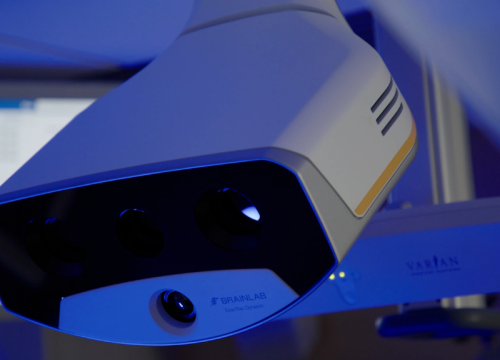A cancerous tumor that starts in the liver is a primary liver cancer. Cancer that develops in another part of the body, like the colon, and spreads to the liver is a secondary liver cancer. This is also referred to as liver metastases.
Like other gastrointestinal cancers, liver cancer treatment may include a combination of treatments, including surgery, chemotherapy and radiation therapy. At Valley, you’ll have an experienced team of specialists guiding you through every step of your care.
The Valley Approach to Liver Cancer
Our gastrointestinal cancer specialists are part of Valley-Mount Sinai Comprehensive Cancer Care. This partnership offers the highest level of liver cancer care — with the comfort and convenience of a hospital close to home.
From diagnosis and treatment to survivorship, we offer everything you need, in one place.
Your care team could include:
- Medical oncologists
- Surgical oncologists
- Radiation oncologists
- Hepatologists
- Gastroenterologists
- Interventional radiologists
Types of Liver Cancer
Valley offers comprehensive care for all types of liver cancers, including:
- Hepatocellular carcinoma (HCC): The most common type of primary liver cancer, often related to hepatitis (liver infection) or cirrhosis (liver scarring).
- Cholangiocarcinoma: Sometimes called bile duct cancer, this cancer starts in the bile ducts within the liver.
- Angiosarcoma: A rare liver cancer that starts in the blood vessels.
- Liver metastases: Cancer from another part of the body that has spread to the liver.
Liver Metastases
Colon cancer or rectal cancer that has spread to the liver is the most common type of liver cancer overall.
Liver metastases can also occur in patients who have:
- Breast cancer
- Esophageal cancer
- Lung cancer
- Kidney cancer
- Pancreatic cancer
- Skin cancer
Liver Cancer Risk Factors
You may have an increased risk for liver cancer if you have:
- Family history of liver disease
- Chronic hepatitis B or C infections
- Cirrhosis
- Type 1 or Type 2 diabetes
- Fatty liver disease
- Genetic or inherited diseases like hemochromatosis
- High cholesterol
- Obesity
Other factors that may increase your risk for liver cancer are:
- Exposure to toxins, like pesticides
- Excessive alcohol consumption (more than three drinks per day)
- Smoking
Liver Cancer Symptoms
Signs of liver cancer often don’t show until later stages. Liver cancer symptoms can be vague and look like other conditions. See one of our experienced hepatologists if you have:
- Pain in your upper right abdomen
- A hard lump under your right rib cage
- Abdominal swelling
- Yellowing of the skin and eyes (jaundice)
- Nausea or vomiting
- Fatigue
- Unintended weight loss
- Pale, chalky stool
- Dark urine
- Loss of appetite
- Fullness after a small meal
Liver Cancer Treatment at Valley
Your care team will work with each other and you to develop a care plan tailored to your needs and preferences. This may include using a combination of therapies to treat the cancer.
Surgery for Liver Cancer
Surgery may be an option to remove liver cancer. In a procedure called a partial hepatectomy, or liver resection, surgeons remove part of the liver with the tumor.
Valley has as an experienced team of hepato-pancreato-biliary surgeons. These surgeons specialize in performing complex surgeries to treat diseases of the liver, gallbladder, and bile ducts.
Depending on the size and location of the tumor within the liver, you may be a candidate for robotic surgery. This type of minimally invasive surgery typically includes smaller incisions, less pain after surgery, and a faster recovery.
Thermal Ablation Therapy for Liver Cancer
Thermal ablation involves delivering heat through a thin probe or needle to destroy cancer cells. For liver cancer, it may be given through the skin (called percutaneous ablation) or during an operation.
Our team is highly skilled in interventional radiology procedures like ablation. We offer image-guided thermal ablation using ultrasound, CT or MRI for better accuracy and precision.
Thermal ablation therapy for liver cancer includes microwave ablation (MWA). Microwave ablation is most common type of thermal liver ablation, and it uses heat from electromagnetic waves.
Radiation Therapy for Liver Cancer
Radiation therapy uses radiation to destroy or tumors. Our radiation oncologists specialize in destroying the cancer while avoiding healthy surrounding tissue.
Valley has innovative technologies that improve radiation accuracy, including ExacTrac Dynamic by Brainlab. ExacTrac gives us additional views inside and outside of the body to better plan for your body’s normal movements, like breathing.
We offer the following advanced radiation therapies and techniques for liver cancer:
- Image-guided radiation therapy (IGRT): We use the latest, real-time imaging to guide radiation directly to the liver tumor. This reduces the chance for damage to healthy tissue.
- Stereotactic body radiotherapy (SBRT): SBRT is a type of precise, high-dose external radiation called stereotactic radiosurgery. This therapy is a highly targeted radiation treatment that doesn’t use cuts. At Valley, we use Gamma Knife technology.
- Respiratory gating: Radiation oncologists use method to deliver radiation at different points in your breathing cycle when your liver is in a specific position. This technique helps protect surrounding healthy tissue.
Y90 Radioembolization Therapy for Liver Cancer
Y90 radioembolization combines internal radiation therapy and embolization (blocking blood flow). Your Valley care team for Y90 radioembolization may include both a radiation oncologist and an interventional radiologist.
Internal radiation therapy uses tiny particles inserted at the tumor to direct radiation to a specific spot, sparing nearby healthy tissue. Embolization blocks blood flow to the tumor, taking away its ability to grow.
With Y90 radioembolization, your provider will insert beads with a radioactive isotope into the blood vessels. This blocks the blood supply to the tumor and delivers a high dose of radiation.
Chemotherapy, Targeted Drug Therapy and Immunotherapy for Liver Cancer
Valley’s medical oncologists specialize in using the latest medications and therapies to treat liver cancer. Our team also has expertise in precision medicine, using molecular profiling and genetic testing to help guide your treatment plan.
Your care plan may include:
- Chemotherapy: Chemotherapy drugs kill cancer cells throughout the body. These drugs are used more often in the treatment of cholangiocarcinomas, often with the addition of immunotherapy.
- Targeted therapy: We may use medicines to target specific mutations or receptors on cancer cells. For liver cancer, certain targeted therapies can stop cancer cells from replicating or block blood flow to a tumor.
- Immunotherapy: This therapy uses the body’s own immune system to fight cancer. We may use medicines called immune checkpoint inhibitors to boost your natural defense against liver cancer.
Why Choose Valley for Liver Cancer Care?
- Expertise in liver cancer treatment: Valley specializes in the full range liver cancer treatments, and you get it all right here. As a team, we’ll work with you to determine the best treatments for your specific cancer.
- Expert cancer care, close to home: Our Valley-Mount Sinai Comprehensive Cancer Care offers the highest level of expertise from an academic medical center in your neighborhood. That means you don’t have to go far for expert cancer care.
- Collaborative treatment from a skilled team: Our gastrointestinal cancer team meets regularly to discuss patients’ care plans. This brings together a team of medical oncologists, surgical oncologists, radiation oncologists, interventional radiologists and other specialists all focused on you.
- Complete cancer care and support services: We understand that cancer treatment can affect all aspects of your life. We offer a wide range of cancer support services like support groups, nutrition counseling and more.
- Compassion you can count on: When you come to Valley for cancer treatment, you’re in good hands. Our team makes you feel comfortable and cared for. We guide and support you and treat you like family.

















